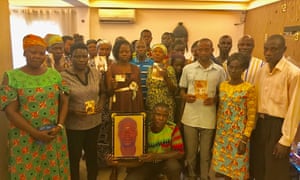A mass grave containing the bodies of 12 west Africans allegedly killed by a paramilitary force controlled by the former president Yahya Jammeh has been identified near the Gambian capital, Banjul.
The “Junglers”, a notorious hit squad that answered only to Jammeh, executed 54 people who were trying to make their way to Spain by sea in 2005, suspecting them of being mercenaries trying to overthrow the government, according to human rights groups that interviewed 30 Gambian officials.
The only survivor of the massacre told the Guardian that he and his friends were arrested at sea and tortured before being driven to a forest, where they were killed.
“Once we entered the navy boat, the torture started,” said Martin Kyere, who is from Ghana. “When we landed in Banjul, we found a lot of military men waiting on the shore, armed with guns and cutlasses.”
He said that on the way to the forest, when a fellow captive complained that he was in pain, one of the military men lunged at him with his cutlass. “His arm nearly fell off his body,” Kyere said. “All of us were tied by our hands. I succeeded in untying myself and fled.”
Just before he jumped off, his friends whispered to him, asking him to find their families if he made it back to Ghana, and tell them what had happened. As he ran, behind him he heard the others crying, “Oh God, help us!” Then he heard gunshots.
Over the course of a week, near Banjul as well as Jammeh’s home town of Kanilai, the Junglers killed all 54 people, according to the human rights groups. Most of their bodies have never been found.
For this crime Human Rights Watch and Trial International are building a case to prosecute Jammeh, who remains in exile in Equatorial Guinea after losing the 2016 election. He initially conceded victory, then changed his mind and holed himself up in the presidential palace, before finally being persuaded to leave, taking with him a fleet of luxury cars.
A former military officer who in 1994 led the overthrow of a democratically elected government, Jammeh presided over a brutal regime characterised by allegations of human rights violations, including claims of extrajudicial killings and torture.
The Gambia is preparing to launch a truth, reconciliation and reparations commission to examine crimes committed between 1994 and 2017, but with its justice system being radically reformed and very little money, it is unlikely that the small west African country would be able to prosecute Jammeh even if it could secure his extradition.
So Human Rights Watch and Trial International are seeking other options.
“We’re looking for the Ghanaian government to extradite him to Ghana to try him for this crime,” said Reed Brody, counsel at Human Rights Watch.
A senior police source who did not want to be named told the Guardian that he saw some of the victims at the police station that day in July 2005.

“I found about 12 of them, looking shaken and terrified. There are indications that they were beaten,” he said. “I left them there.”
He took the Guardian to the crime scene he was later told to investigate in Brufut, near Banjul. “When I arrived at the scene, I found three dead bodies here,” he said, pointing at the scene of thick shrubbery, a few metres off the road. Searching further, he discovered six more.
The police source said he was worried the authorities were “not showing enough interest” in the matter. “I informed some police authorities about the mass grave but no action has been taken,” said the source. “I think there are still a lot of people in the system who are loyal to the former government.”
Martin Kyere said that as he fled, his captors shot at him. But after three days in the bush, he made it to neighbouring Senegal and then to the Ghanaian embassy.
When he got home, he went to find his dead friends’ relatives, as they had asked. But it was a terrible task.
“Anywhere I go to relate the news, people will be crying. Some had wives and kids.”


Comments